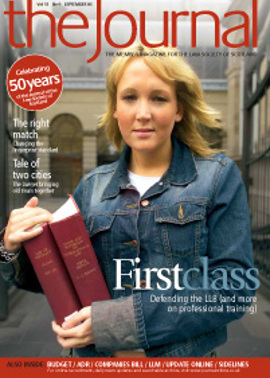Survival of the fittest?

The debate in the Journal in recent months has so far focused on the pros and cons of the LLB degree and whether it provides suitable preparation for life as a solicitor. As many graduates are discovering, however, the LLB only represents the first hurdle along the path to qualification. Indeed life post-LLB is becoming increasingly competitive and is worthy of some analysis.
Scotland is now awash with LLB providers, five new institutions having received accreditation from the Law Society of Scotland over the last few years. A total of 10 universities in Scotland now offer a range of legal study options, including two-year accelerated and part-time courses. Competition for places is still high, but the range of study opportunities is great and therefore, generally, there is good access to the conventional first rung of the professional ladder.
Reaping the harvest
As predicted by academic commentators, however, the by-product of an increase in LLB graduates is becoming manifest. Recently qualified solicitors will recall that securing a Diploma place a few years ago was almost automatic for anyone who wanted to embark on this route. This year 840 graduates who chose to apply for the Diploma in Legal Practice competed for 600 places. This level is unprecedented and means that almost 30% of applicants failed to secure a place.
What is more serious is that some unsuccessful candidates had already secured traineeships – which were presumably rendered void if the relevant firm chose not to allow deferral of the training contract. Although the number of applicants affected by this particular problem was low, the disparity suggests that even though a firm can assess a graduate to be worthy of recruitment as a trainee, the candidate can still potentially be denied a place on the Diploma due to places being allocated on academic merit. This is cause for concern to the firm, as well of course as the unlucky student. The situation also presumes that academic performance directly translates into professional competence, which is not necessarily the case with regard to a number of the desired skills.
An ever-tighter squeeze
However unfortunate this may appear, is there any viable alternative? The Society’s role is with regard to the curriculum, while responsibility for the number of Diploma places is at the discretion of each provider, dependent on the demand for places and the resources at their disposal. Furthermore, the number of traineeships available each year is naturally subject to market forces (to a lesser extent in the public sector), and is usually markedly less than the number of Diploma places provided. For example, 451 traineeships were commenced in 2004 compared to just over 500 Diploma graduates. Therefore, were it not potentially to fall foul of competition laws, capping the total number of Diploma places would seem to be a prudent move, as, logically, the qualification is only gained for the purpose of undertaking a training contract (and for entry into the Faculty of Advocates). Those who have finished the Diploma have up to two and a half years to apply for a traineeship, but whichever way the numbers fall it is clear that there could still be a surplus of applicants.
This is where barriers to joining the legal profession are crystallising. The bottleneck traditionally occurred when trying to secure a traineeship, but is now becoming accentuated by fiercer competition for Diploma places. Additionally, since 1996, the amount of funding available for Diploma students to cover most of the course fees of £4,050 has been limited by the SAAS to 300 applicants. The increasing levels of undergraduate student debt are well documented, so the addition of postgraduate course fees, not to mention living expenses, may prevent students of more limited means from choosing this career route. Research has already established that students from lower socio-economic groups are more under-represented in law than in other subjects in Scotland. Allocation of funding is also dependent on academic merit, which may disproportionately penalise less advantaged students obliged to take on part-time work during their undergraduate years. These factors could raise more general issues regarding the current format of the three-year period between graduation and qualification in terms of the cost burden on those entering the profession.
Constant debate
The Society and the universities introduced the mandatory Diploma in Legal Practice from 1980, in reaction to perceived deficiencies in apprenticeships amongst law graduates and the profession as a whole. This was intended to provide modules on practical law taught by experienced practitioners (in contrast to the academics teaching the LLB), alongside the traineeship replacing the apprenticeship. The Professional Competence Course (PCC) and Test of Professional Competence were introduced in 2000, to build on and consolidate the Diploma content in relation to the experience gained during the traineeship.
Since its inception, the format of the Diploma has been much debated and this is likely to continue. The course still has its detractors amongst both students and employers. Although the teaching is undertaken by practitioners, many employers argue that the curriculum is divorced from their aspirations and needs. However, due to the increasing specialisation of the profession, the holistic subject nature of the Diploma is arguably the only practical format for the course. It is also worth noting that a number of larger firms choose to deliver their own PCC modules in-house in order to integrate the modules with particular aspects of the traineeships they provide. In this context, an analysis of other jurisdictions in the UK may prove interesting.
Another model?
In England and Wales, the Legal Practice Course fulfils a similar function to the Diploma, but in Northern Ireland professional training is radically different. A two year apprenticeship involves an initial period in the office from September to December; the next year spent at the Institute of Professional Legal Studies
(on a course the equivalent of the Diploma); and then the next six months back in the office.
Such a format, if used in Scotland, could potentially resolve a number of the underlying problems. It is unlikely that employers would welcome the removal of trainees for a year in the middle of the traineeship, but the synthesis of the vocational (the Diploma content) and the practical (in-office experience) is attractive. Trainees could undertake an initial course but then commence the traineeship almost immediately, undertaking study programmes in the various Diploma modules (also taking in the PCC) one day a week or via alternative study methods, i.e. independent and remote learning via the internet. This way, employers would have a greater stake in the period of professional legal education. Additionally, the LLB graduates’ speedier entry into the job market would relinquish some of the additional debt associated with the full-time Diploma year, and the disparity in numbers between the traineeships and Diploma places available would be removed as a place on the Diploma would become contingent on securing a traineeship.
The Society is alive to these issues, and the Education and Training Department is currently finalising a comprehensive online consultation document on the full spectrum of legal education (LLB, Diploma, traineeship, PCC/TPC and CPD) which will be disseminated to all interested parties during November this year. It is essential that current Diploma students, trainees and recently qualified solicitors make the appropriate submissions reflecting their experiences of professional training for new solicitors.
Michael Torrance completed the part-time LLB at Strathclyde University and has recently started the Diploma in Legal Practice at Edinburgh University. He will be commencing a traineeship in Edinburgh from July 20070
In this issue
- Sincere thanks are due
- From the grass roots
- Training solicitors and teaching law
- Survival of the fittest?
- A new print job
- Plenty more besides
- That's settled, then
- East meets west
- A shot in the arm
- Tapping into CPD Online
- Master trainee
- Glitch hunt, not witch hunt
- A caveat on witnesses
- Victories for tenants?
- On your marks...
- Big bill for business
- Ripple effect
- How fair is fair?
- Scottish Solicitors' Discipline Tribunal
- Website reviews
- Book reviews
- Spinning plates
- Sending the right signals






